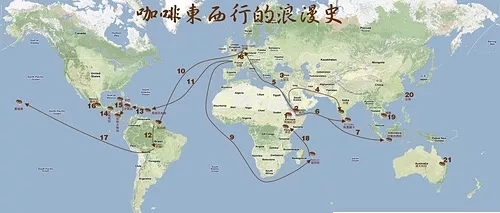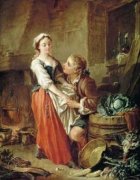began in the 17th century. Learn more about began in the 17th century.
-
The emergence of coffee demand in Europe began with the history and culture of coffee in the 17th century.

In the 17th century, there was a demand for coffee in Europe and began to import small quantities of roasted coffee beans from Yemen. In the 18th century, with the fragrance of European cafes and the sharp increase in coffee bean consumption, the Yemeni mocha alone was no longer enough. It is estimated that the output of coffee beans in Yemen in 2007 ○○ is about 20, 000 tons, which is stretched to meet the rising demand of Europe. The price of beans is high and the port of Mocha is busy.
2015-02-12 Europe emergence coffee demand began in the 17th century history and culture the 17th century. -
The emergence of coffee demand in Europe began in the 17th century

In the 17th century, there was a demand for coffee in Europe and began to import small quantities of roasted coffee beans from Yemen. In the 18th century, with the fragrance of European cafes and the sharp increase in coffee bean consumption, the Yemeni mocha alone was no longer enough. It is estimated that the output of coffee beans in Yemen in 2007 ○○ is about 20, 000 tons, which is stretched to meet the rising demand of Europe. The price of beans is high and the port of Mocha is busy.
2015-04-02 Europe the emergence of coffee demand began in the 17th century. -
Demand for coffee in Europe began in the 17th century with charcoal coffee stoves

In the 17th century, demand for coffee emerged in Europe, and small quantities of roasted coffee beans began to be imported to Yemen. In the 18th century, coffee shops were everywhere in Europe, coffee consumption soared, and Yemeni mocha alone was no longer enough. It is estimated that Yemen's coffee bean production in 1970 was about 20,000 tons, which is already insufficient to meet the newly emerging European demand. Bean prices remain high,
2016-04-20 Europe Emergence Coffee Demand Beginning 17th Century Charcoal -
Coffee culture the emergence of coffee demand in Europe began in the 17th century.

In the 17th century, there was a demand for coffee in Europe and began to import small quantities of roasted coffee beans from Yemen. In the 18th century, with the fragrance of European cafes and the sharp increase in coffee bean consumption, the Yemeni mocha alone was no longer enough. It is estimated that the output of coffee beans in Yemen in 2007 ○○ is about 20, 000 tons, which is stretched to meet the rising demand of Europe. The price of beans is high and the port of Mocha is busy.
2015-04-02 Coffee culture Europe emergence coffee demand began in the 17th century. -
Coffee culture the emergence of coffee demand in Europe began in the 17th century.

In the 17th century, there was a demand for coffee in Europe and began to import small quantities of roasted coffee beans from Yemen. In the 18th century, with the fragrance of European cafes and the sharp increase in coffee bean consumption, the Yemeni mocha alone was no longer enough. It is estimated that the output of coffee beans in Yemen in 2007 ○○ is about 20, 000 tons, which is stretched to meet the rising demand of Europe. The price of beans is high and the port of Mocha is busy.
2015-04-03 Coffee culture Europe emergence coffee demand began in the 17th century. -
History of Coffee Culture on the Source of Coffee

The history of coffee can be traced back to the tenth century AD, but those are unverifiable history. For example, the widely spread story of shepherds, the story of monks across the desert and so on. What is really well documented is the spread time of coffee beans, that is, from Africa to Europe and the whole world, probably around the 16th-17th century AD, which is known to be a great voyage.
2014-09-05 -
Indian-style Malabar coffee has been favored by Europeans since the 17th century.

Professional coffee knowledge exchange more coffee bean information Please follow the coffee workshop (official Wechat account cafe_style) refined wind-stained coffee on rainy days ~ we'll talk about it later. Coffee became the number one drink in the world only 1600 years later, so the recorded history of coffee is only 400 years similar to that of Taiwan. Most people recognize that Africa is the origin of coffee.
2019-03-19 India Wind stains Mara Barr Coffee since the 17th century has been received Europe -
Coffee dissemination chronology

Arab (eleventh century) Egypt, Syria (13th century) Damascus (16th century) Europe (17th century) the earliest people who planned to grow and eat coffee were Arabs. At the beginning of the eleventh century, people in the Arab region boiled coffee into soup or dried it and then boiled it as stomach medicine. Because of the strict Muslim precepts and forbidden to drink alcohol, Muslims
2016-10-19 Coffee spread chronology Arab first Century Egypt Syria . Thirteen -
Coffee dissemination chronology

Coffee spread to Arabia (eleventh century), Egypt, Syria. (13th century) Damascus (16th century) Europe (17th century) the first people to plan to grow and eat coffee were Arabs. At the beginning of the eleventh century, people in the Arab region boiled coffee into soup or dried it and then boiled it as stomach medicine. Because Muslim precepts are strict and alcohol is strictly forbidden, Muslims
2014-07-01 Coffee spread Coffee History -
After reading the spread history of coffee, feel the romance of coffee traveling around the world.

Professional coffee knowledge exchange more coffee bean information Please pay attention to the coffee workshop (Wechat official account cafe_style) Coffee will become a world drink, is accompanied by the great navigation era of the 17th and 19th century, after three hundred years coffee beans, coffee seedlings planted all over the world, including the Netherlands, France brought coffee beans to colonization, newly developed regions of the Caribbean, Central and South America, the 19th century
2019-04-03 One article read coffee spread feel travel around the world romantic professional -
When did coffee become popular?

The cultivation and production of coffee in the 17th century was monopolized by Arabs. It was used mainly in medicine and religion, doctors and monks recognized coffee as refreshing, refreshing, invigorating, strengthening, hemostatic, etc.; the use of coffee began to be documented in the early 15th century, and it was incorporated into religious ceremonies during this period, as well as appearing in folk as a daily drink. Islam
2016-08-01 coffee beans origin coffee when popular rise 17th century species -
The relationship between baking mode and region

In the past, the depth of baking used in different places was very different, which was very similar to the taste preference of modern regional people. For example, in most parts of Europe in the 16th and 17th centuries, they drank very deep-roasted Turkish-style coffee. For example, in a 17th century homemade baking advice booklet, it was described as follows: take any amount of coffee you like.
2014-08-15 Coffee knowledge roasting mode coffee roasting regional differences -
The origin of coffee
Legend has it that three thousand years ago, shepherds and monks in the mountains of Ethiopia were excited to find that their sheep had eaten unknown fruits and leaves. They were initially regarded as medicines to treat mild headaches and diarrhea, and it was not until the fifteenth and sixteenth centuries that they evolved into the present method of drinking among Arabs. Second, spread and promote A. Coffee is the earliest.
2014-08-22 Coffee origin discovery legend three thousand years ago Yesso Pia Ethiop -
Introduction to the making method of coffee, one of the three major drinks in the world

The cultivation and production of coffee in the 17th century has always been monopolized by Arabs. At that time, it was mainly used in medicine and religion, and doctors and monks admitted that coffee had the effects of refreshing, awakening, strengthening the stomach, strengthening the body and stopping bleeding. The use of coffee was documented at the beginning of the 15th century and was integrated into religious ceremonies during this period. At the same time, it also appeared in the folk as a daily drink. Because of Islam
2016-06-29 World three Beverage one Coffee making way introduction 17th Century -
Where did the earliest coffee come from? how was the earliest coffee handled in the first place?

The cultivation and production of coffee in the 17th century has always been monopolized by Arabs. At that time, it was mainly used in medicine and religion, and doctors and monks admitted that coffee had the effects of refreshing, awakening, strengthening the stomach, strengthening the body and stopping bleeding. The use of coffee was documented at the beginning of the 15th century and was integrated into religious ceremonies during this period. At the same time, it also appeared in the folk as a daily drink. Because of Islam
2016-05-24 Early coffee from where start how deal with 17th century -
Indian style Malaba treatment what is Indian monsoon coffee? What kind of coffee is Malaba coffee?

Professional coffee knowledge exchange more information about coffee beans Please follow the coffee workshop (Wechat official account cafe_style) Indian style-stained Malaba coffee has been favored by Europeans since the 17th century. This kind of wind-stained coffee is a new flavor created inadvertently. In the 17th and 18th centuries, India shipped coffee beans to Europe by sailboat, which took six months to buy raw beans.
2019-04-02 Malaba Raba Coffee grading system recommendation what is it Rabbah -
Art Gallery Restaurant Coffee-Xi'an Zhimeng Space Gallery Coffee

The cultivation and production of coffee in the 17th century has always been monopolized by Arabs. At that time, it was mainly used in medicine and religion, and doctors and monks admitted that coffee had the effects of refreshing, awakening, strengthening the stomach, strengthening the body and stopping bleeding. The use of coffee was documented at the beginning of the 15th century and was integrated into religious ceremonies during this period. At the same time, it also appeared in the folk as a daily drink. Because of Islam
2016-12-29 Art Gallery Restaurant Coffee Xi'an Dream Building Space 17th Century species -
Turkish coffee shops promote the British democratic revolution

The medieval theory of divine kingship began to crumble in England in the seventeenth century, and after the Glorious Revolution the basis of government had shifted from kings as God's agents on earth to the hands of people bound together by social contracts. After experiencing this great historical turning point, it can be said that the creed of modern democratic society, that is, the will of heaven, was formed. Ren Min Tong
2014-07-30 From Turkey Its Cafe Push England Democratic Revolution Progress 17th century -
Six questions related to coffee can coffee suppress sexual impulses?

Can coffee suppress sexual impulses? in the early 17th century, when Europeans began to experiment with coffee, it was a popular idea in Britain that coffee could suppress sexual impulses, drink too much and even lose sexual ability, and it was a favorite drink for abstinent monks. Under this concept, it is worth noting that the first cafe in London was able to open around 1688. Relative to
2015-06-24 Coffee related six problems ability restraint impulse -
Coffee Story in Amsterdam Coffee background in Amsterdam

Professional Coffee knowledge Exchange more information on coffee beans Please follow the Coffee Workshop (Wechat official account cafe_style) the New World in the mid-17th century, coffee was brought to New Amsterdam and was later called New York by the British. Although cafes soon began to appear, tea remained the most popular drink in the New World until 1773, when the colonists rebelled against the expropriation of tea by King George III.
2019-11-26 Coffee Amsterdam story background specialty coffee knowledge communication more
